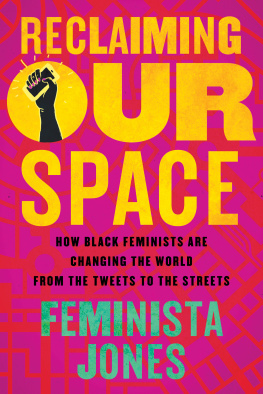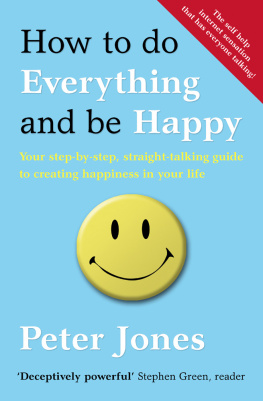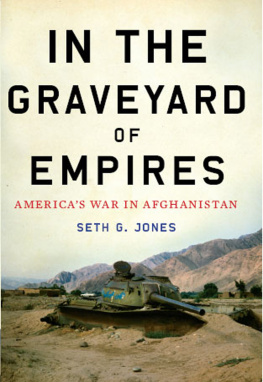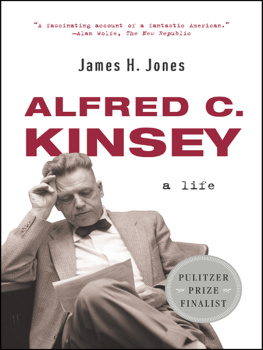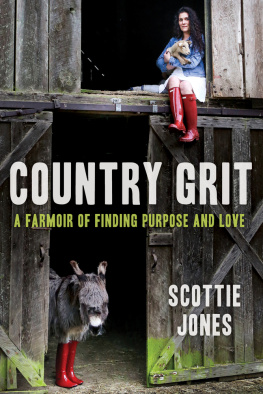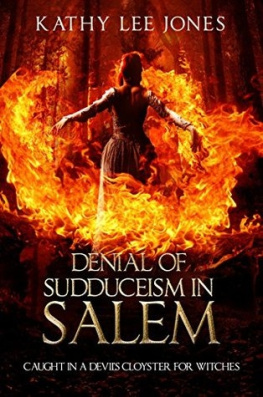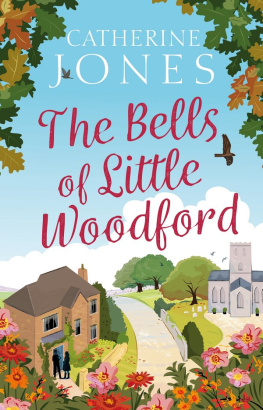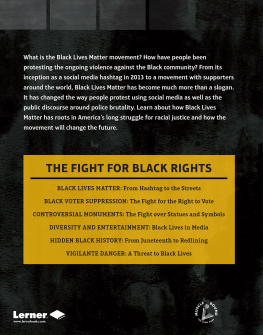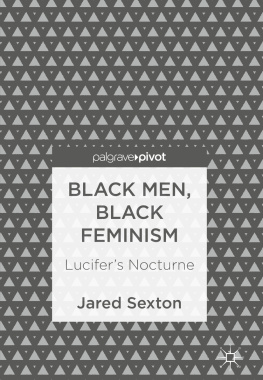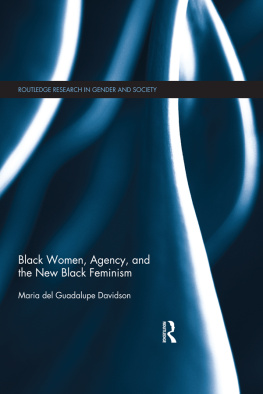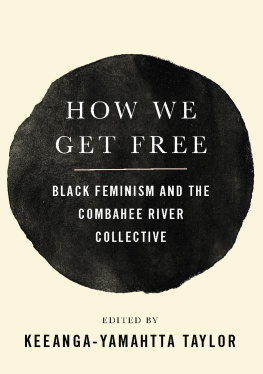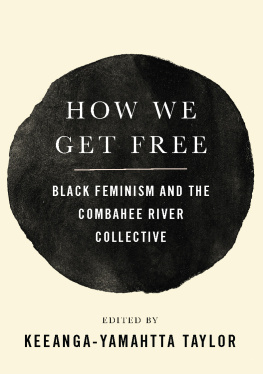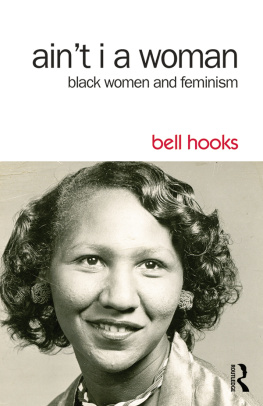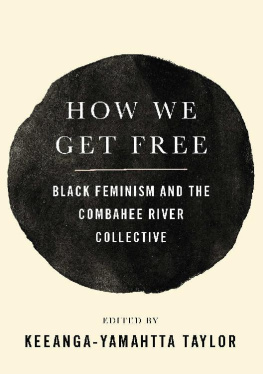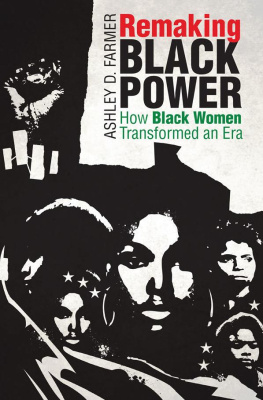Table of Contents
Pagebreaks of the print version
Guide
Advance Praise for Reclaiming Our Space
If you want to understand the rising preeminence of black women in our modern-day sociopolitical landscape, you would be smart to start with Feminista Jones, a black woman writing and working at the forefront of our movements.
IJEOMA OLUO , author of the New York Times bestseller So You Want to Talk About Race
Reclaiming Our Space is an invaluable contribution to long-overdue conversations about race, gender, and intersectionality in America. Feminista Jones combines empathy and wisdom with intellectual rigor and historical analysis to explain clearly and compellingly the central role that Black feminists play in the fight for democracy and social justice.
SORAYA CHEMALY , director of the Womens Media Center Speech Project and author of Rage Becomes Her
Reclaiming Our Space is a refreshing affirmation of Black women, centering our societal roles in a way I have never read before. For those of us whose race and gender exist at a precarious intersection, Reclaiming Our Space is a godsend that will inform not only how we are approached and regarded by others through social media platforms but how we interact with each other and value ourselves.
CASHAWN THOMPSON , creator of #BlackGirlMagic
Its impossible to overstate the cultural impact of Feminista Jones. As a bold and candid voice in the blogosphere and on social media, before intersectional feminism made its necessary move from the realm of academia to circulation in popular culture, Feminista spoke loudly and clearly about the particular identities and predicaments of Black women in America. She has been tough, she has been honest, and she has been that thing that ignorant people like to pretend is somehow incompatible with feminism: shes been funny. From motherhood to street harassment, she has worked to uplift issues facing Black women, time and time again, with ferocity and love.
EVE L. EWING , author of Electric Arches and Ghosts in the Schoolyard
As often as I find myself disillusioned by todays political climate, Feminista Jones reminds us that Black women have always been and continue to be at the forefront of social change both online and IRL. Reclaiming Our Space is a thorough and accessible history of Black feminism that reflects on our past as a means of encouraging us to move toward a better future.
FRANCHESCA RAMSEY , host of MTVs Decoded and author of Well, That Escalated Quickly: Memoirs and Mistakes of an Accidental Activist
In a world where many call themselves feminist, educator, healer, and community leader Feminista Jones provides tangible steps for those seeking to do a better job of showing up and holding space for Black women. Reclaiming Our Space is required reading for brothers who fashion themselves supporters of our sisters, as well as those who dont yet know they need to be. Its also soul food for the rest of yall desiring to move toward a better future.
DAVID JOHNS , executive director of the National Black Justice Coalition
OTHER BOOKS BY FEMINISTA JONES
The Secret of Sugar Water
Push the Button

Dedicated to every Black girl around the world...
Freedom is coming.
INTRODUCTION
It All Started When...

@Cuba_Brown Replying to @heavymain: The weapon called Feminism... was a tool used to destroy the Black family and put Black men in prison
1:26 AM28 Jun 2017

I think the people who have problems with me are those who cant accept the realness of life. And if you cant accept that, then you havent gone through what Ive gone through, and if you havent gone through it, then you cant judge me. If you dont know where Ive been, then how do you know who I am.
LIL KIM , game-changing hip-hop MC
T HE FIRST TIME SOMEONE accused me of being a CIA agent, I laughed. Hard. I could not believe that anyone would make such an absurd assertion. Me? Im just one woman, born in Queens and raised in the Bronx, a hood girl made good, putting a big, fancy degree to work and action by fighting systemic racism, sexism, and classism. I have been a proBlack liberation activist, feminist writer, and community organizer since the late 1990s. Yet somehow my public identity as a feminist woman led to suspicions that I was a government agent. This was a disturbing revelation to me, to say the least.
Then someone accused me of being an FBI agent charged with imprisoning Black men in an effort to further destroy the Black family. This time I did not laugh as hard. Instead, I began to experience a heavy burden of hopelessness and futility. How could people whom I have gone out of my way to defend and for whose needs I have advocatedat a risk to my own safety and that of my familybelieve I would do anything to break up Black families or damage Black communities? I began to wonder seriously: Who and what am I fighting for?
When I was growing up in the 1980s and 1990s, New York City was experiencing unprecedented socioeconomic and political upheaval. The aftermath of the Vietnam War left families torn apart and many Black men unemployed. In 1971, the unemployment rate for Black male Vietnam War veterans under age twenty-four was 20.9 percent, compared with 17.4 percent for Black nonveterans under twenty-four, and 14.6 percent for veterans under twenty-four as a whole. The Bronx is also the birthplace of hip-hop culture, and it was there and during the golden age of hip-hop that I began to figure out who I was, who I wanted to be, and what I wanted to do with my life.
My mother, a lesbian womanist and early AIDS activist, did everything she could to make sure I had access to the best education possible, regardless of cost. I became a prep school Negroone of the young gifted and talented poor kids from the inner city who got a shot at obtaining a privileged education at one of Americas elite boarding schools. I went on to the Ivy League for college and then received advanced degrees and certifications. But my first exposure to feminist thought was not in the classroom. It was by way of female MCs in the late 1980s and early 1990s. I did not recognize it at the time (having no point of reference for contextualizing their messages), but they were the earliest influences in the development of my feminist identity.
When I first heard Ladies First by Queen Latifah and Shake Your Thang by Salt-N-Pepa, I was more excited about their songs than I was about any other hip-hop music. And when TLC debuted with Ooooooohhh... On the TLC Tip, I grew more and more excited about being a girl. A few years later in boarding school, in English classes that focused on women writers and feminist literature, I was exposed to academic feminist thought. Though I was only sixteen at the time, the simple idea that women deserve equal access to social, economic, and political resources and opportunities resonated deeply within me. I grew up in neighborhoods where women were incredibly strong, but my exposure was limited to the experiences of lower-income women and single mothers. Reading about women who were different from me made me feel connected. Though my teachers made genuine attempts to diversify content, with sprinkles of Alice Walker and Maxine Hong Kingston, most of the authors we read were White women. After writing my first critical essays and literary analysis about Sylvia Plath and Virginia Woolf, I decided feminism was where my heart was at, and I became determined to explore more feminist theory

